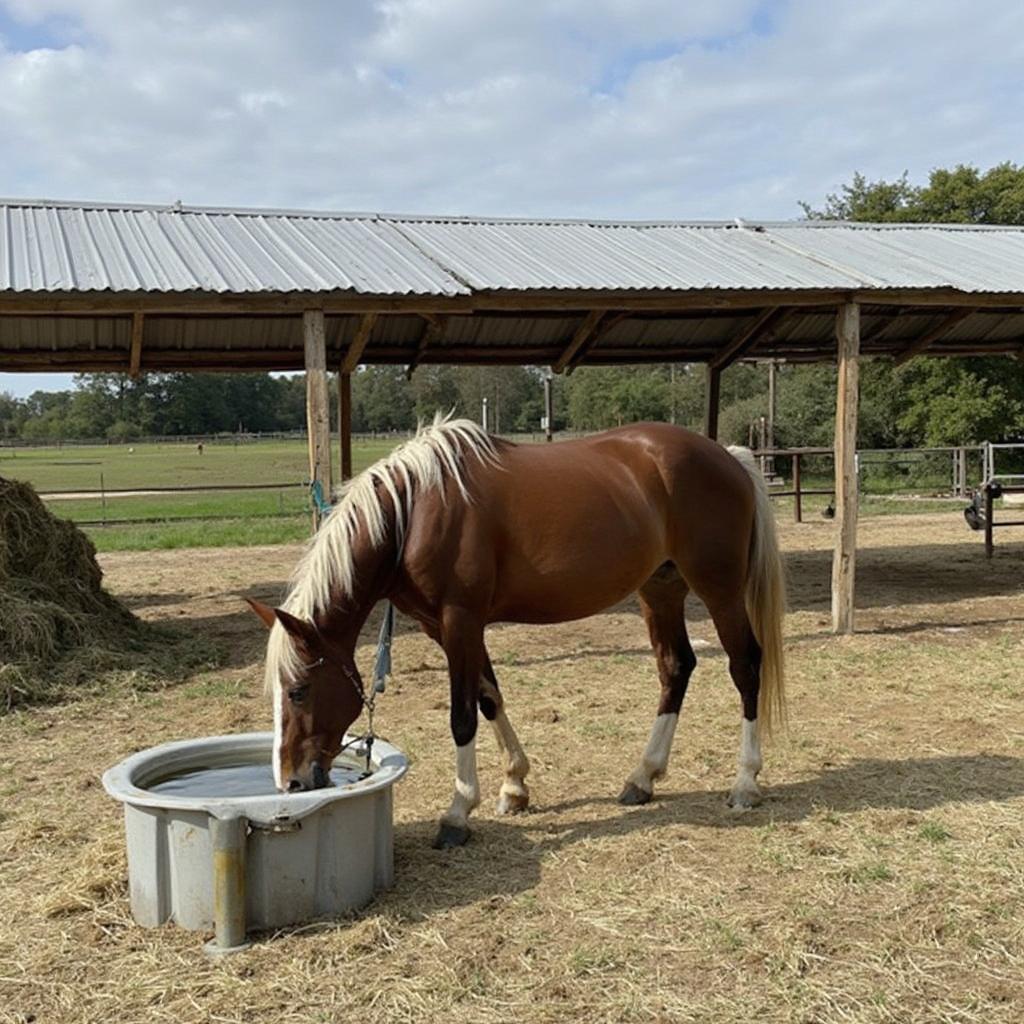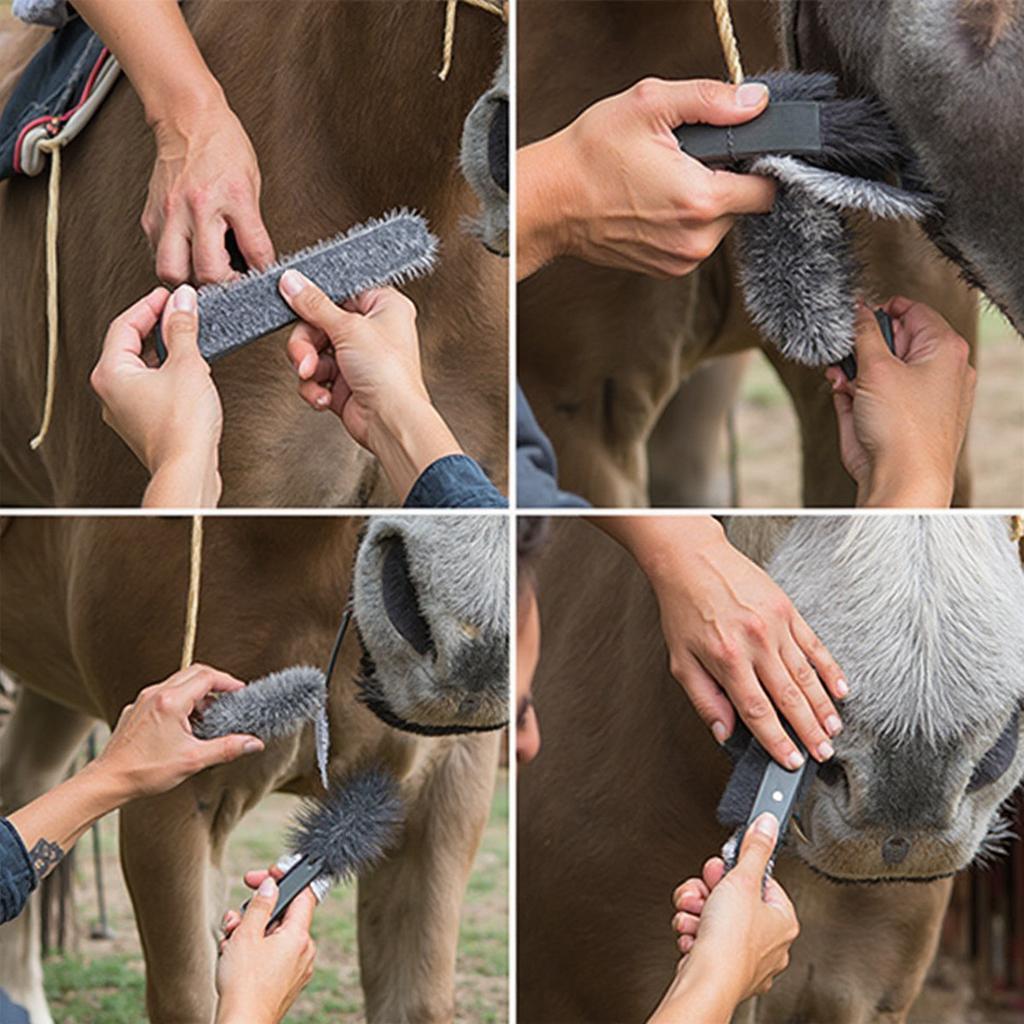Your cart is currently empty!

Horse Care Tips from A to Z: Your Complete Guide
Horse care is a multifaceted commitment encompassing everything from feeding and grooming to health management and hoof care. This comprehensive guide, offering Horse Care Tips From A To Z, will equip you with the essential knowledge to provide optimal care for your equine companion.
Understanding Basic Horse Needs
Horses, as prey animals, thrive on routine and predictability. Providing consistent care builds trust and reduces stress. This starts with meeting their fundamental needs: fresh water, quality forage, and a safe, clean environment. Remember, observing your horse’s behavior is crucial. Changes in eating habits, demeanor, or manure can indicate underlying health issues. Early detection is key to effective treatment. You can find more detailed advice on caring for a horse’s coat in our horse coat care tips guide.
 Horse enjoying fresh water, quality hay, and a clean, sheltered environment
Horse enjoying fresh water, quality hay, and a clean, sheltered environment
A is for Attention: Observing Your Horse
Careful observation is paramount. Monitor your horse’s vital signs, including temperature, respiration, and heart rate. Be attentive to any changes in gait, posture, or behavior. Early detection of potential problems can prevent minor issues from escalating into serious health concerns. For new horse owners, our horse care tips beginners article offers helpful advice.
G is for Grooming: Maintaining a Healthy Coat
Regular grooming is more than just keeping your horse looking its best. It promotes healthy skin and coat, improves circulation, and provides an opportunity to check for injuries or abnormalities. Curry combs, brushes, and hoof picks are essential grooming tools.
 Using curry combs, brushes, and hoof picks for effective horse grooming.
Using curry combs, brushes, and hoof picks for effective horse grooming.
H is for Hoof Care: The Foundation of Soundness
Hoof care is crucial for a horse’s overall well-being. Regular trimming or shoeing by a qualified farrier is essential to maintain proper hoof balance and prevent lameness. Daily cleaning of the hooves removes dirt and debris, preventing thrush and other hoof problems.
N is for Nutrition: Feeding for Optimal Health
Providing a balanced diet is vital. High-quality forage should be the foundation of any horse’s diet, supplemented with grain or concentrates as needed based on individual needs and activity level. Access to fresh, clean water is crucial.
S is for Shelter: Protecting from the Elements
Horses require shelter from extreme weather conditions. A sturdy barn or run-in shed provides protection from rain, wind, snow, and excessive sun. Adequate ventilation is important to prevent respiratory problems. You might want to adapt your horse’s care routine during different seasons, particularly in winter. See our winter care tips for horses for specific advice.
V is for Veterinary Care: Preventative and Reactive
Regular veterinary check-ups are essential for preventative care. Vaccinations, deworming, and dental care are key components of a comprehensive health program. Consult with your veterinarian to develop a tailored health plan for your horse.
“Regular dental check-ups are crucial for a horse’s digestive health,” says Dr. Emily Carter, DVM, an equine veterinarian with over 20 years of experience. “Dental problems can lead to difficulty chewing and impacting overall well-being.”
Dealing with Common Horse Health Issues
Colic, lameness, and respiratory infections are among the most common health issues affecting horses. Prompt veterinary attention is crucial in addressing these problems. Learn to recognize the signs and symptoms of these conditions so you can act quickly. More tips on hot weather horse care can be found in our dedicated guide http www.thehorse.com articles 29338 10-hot-weather-horse-care-tips.
“Recognizing early signs of colic is vital,” adds Dr. Carter. “Knowing your horse’s normal behavior allows you to identify subtle changes that could indicate a problem.”
Conclusion: A Lifelong Commitment
Providing proper horse care is a lifelong commitment. From understanding basic needs to addressing specific health concerns, these horse care tips from A to Z offer a comprehensive guide. By prioritizing your horse’s well-being, you are fostering a strong bond and ensuring a long, healthy life for your equine partner. Regular observation, preventative care, and prompt attention to any issues are key to responsible horse ownership.
FAQ
- How often should I groom my horse?
- What are the signs of colic in horses?
- How often should my horse see a farrier?
- What is the best type of hay for my horse?
- How can I tell if my horse is dehydrated?
- What are the essential vaccinations for horses?
- How can I create a safe environment for my horse?
For further information, please explore our horses care tips section.
We also offer a range of articles covering specific horse care topics, including:
- Nutrition and Feeding
- Health and Wellness
- Training and Behavior
- Stable Management
When you need support, please contact us via WhatsApp: +1(641)206-8880, Email: [email protected] or visit our office at 456 Pine Avenue, Toronto, ON M5V 2J4, Canada. We have a 24/7 customer support team.

Leave a Reply